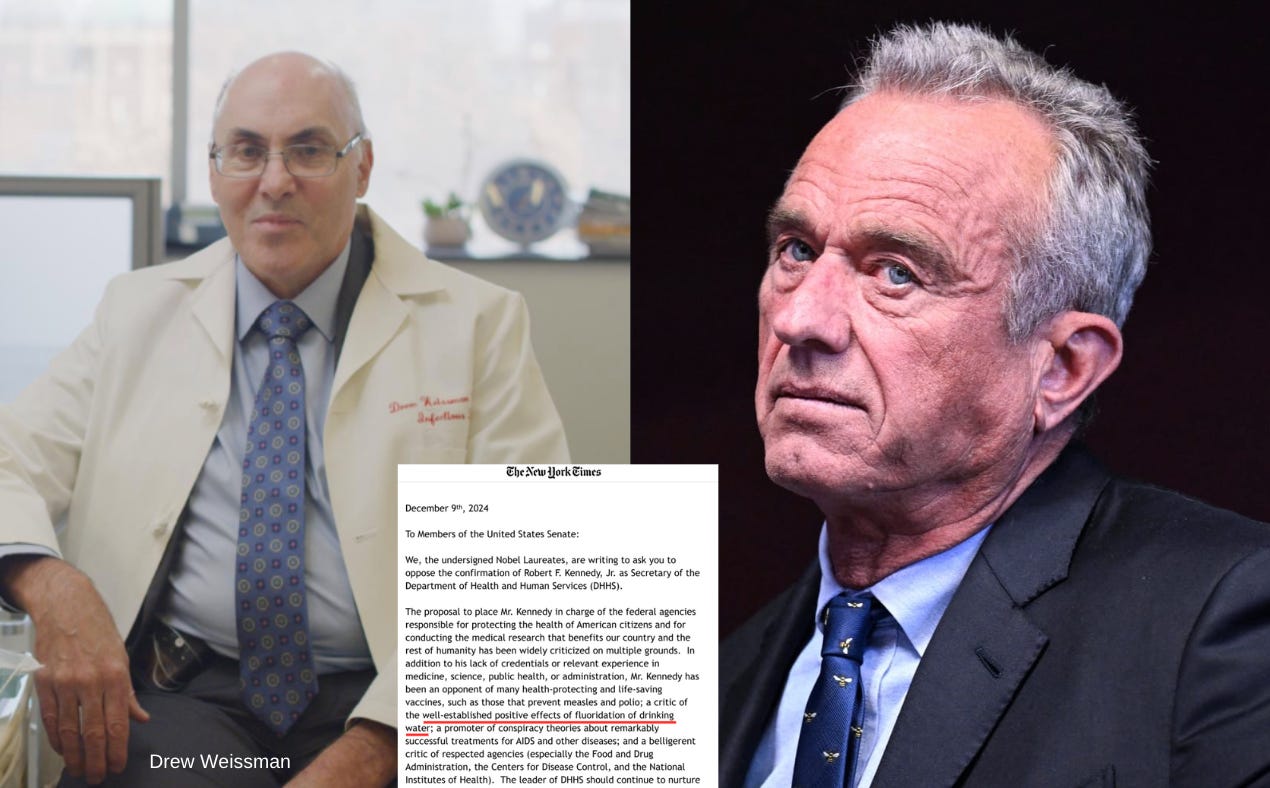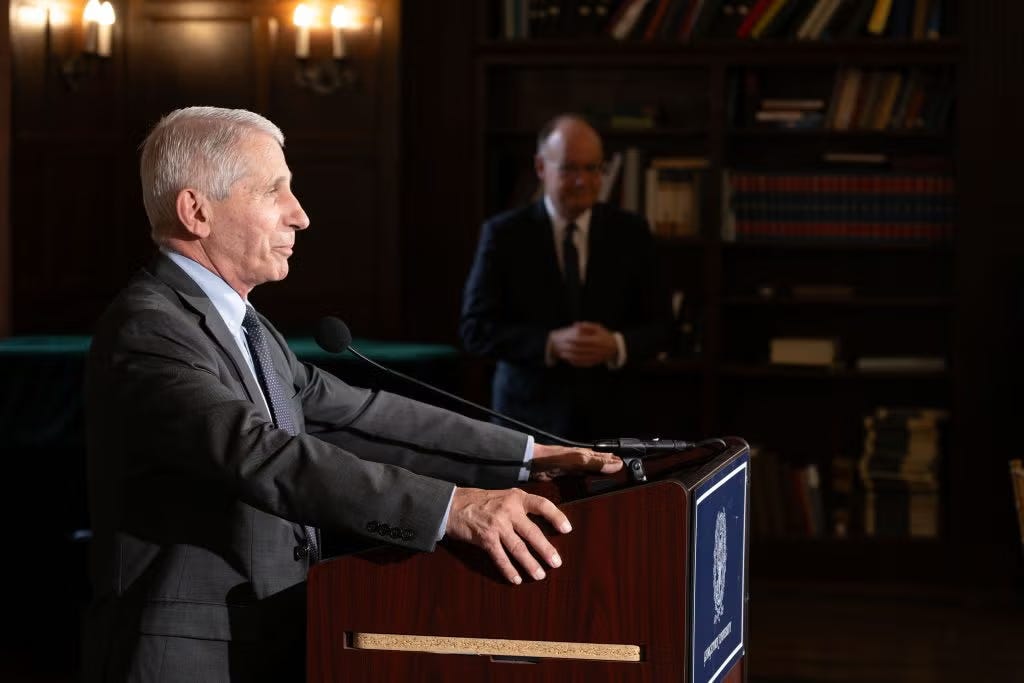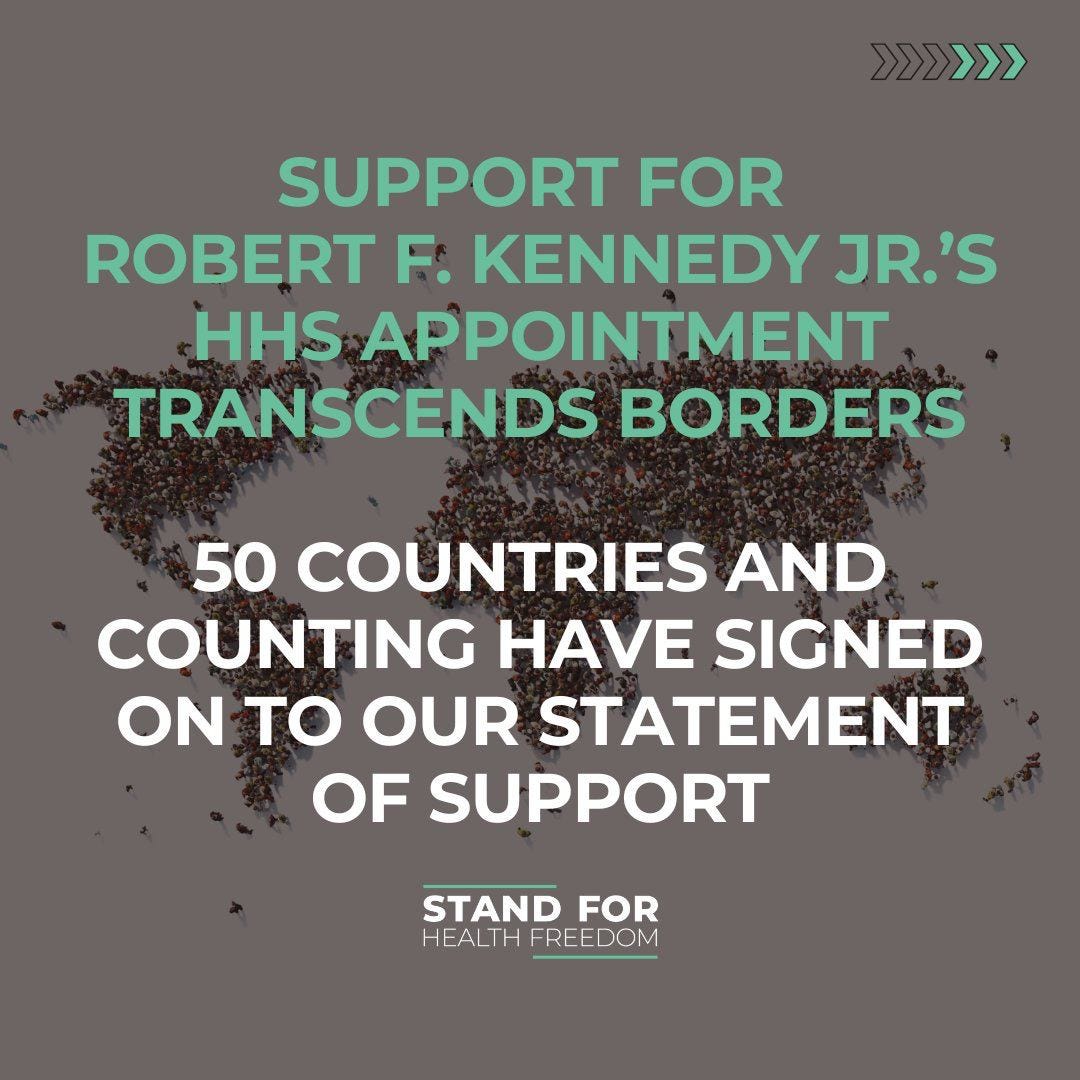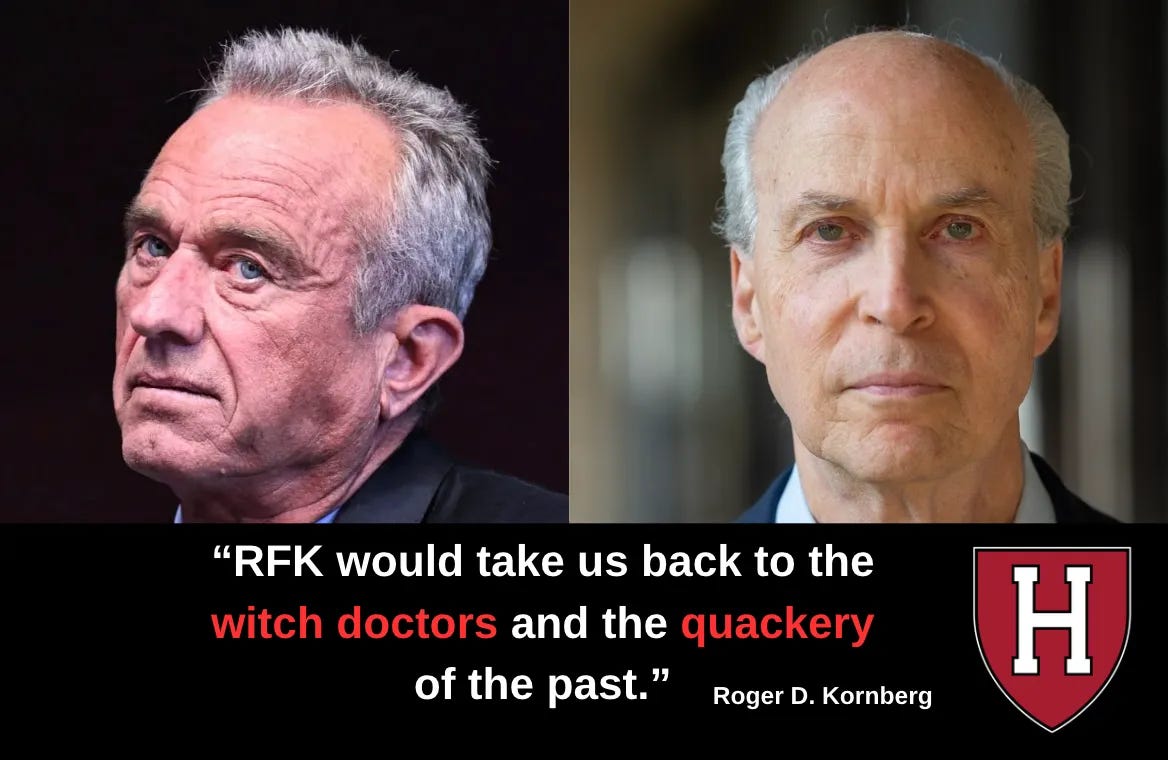What the Nobel Laureates Aren’t Saying: The Real Reason They Oppose RFK Jr
Behind the Nobel Laureates' opposition to RFK Jr.’s DHHS nomination lies a web of hidden conflicts of interest tied to the very industries he seeks to reform
The letter signed by 77 Nobel Laureates opposing Robert F. Kennedy Jr.'s nomination as Secretary of the Department of Health and Human Services (DHHS) has sparked considerable debate. Promoted as a defense of science and public health, the letter’s true motives and the credibility of its signatories demand deeper scrutiny. While these prominent figures position themselves as protectors of scientific integrity, their ties to industries they stand to benefit from, as well as their endorsement of controversial practices like fluoridation, reveal significant conflicts of interest that cannot be ignored.
Moreover, their opposition to RFK Jr. should be viewed in light of the broader systemic issues of regulatory capture—issues RFK Jr. has been consistently vocal about throughout his career. This raises serious questions about the sincerity of their arguments, and what their opposition to RFK Jr.’s nomination reveals about the entrenched interests within the scientific and public health communities.
The Hidden Conflicts of Interest Among Nobel Laureates
The signatories of the letter come from prestigious backgrounds, many with long histories of groundbreaking research. Yet, their significant conflicts of interest deserve attention, especially when considering the broader context of RFK Jr.'s criticism of corporate influence over public health policy.
One key example is Drew Weissman, awarded the 2023 Nobel Prize in Medicine for his groundbreaking work on mRNA technology. Weissman’s research has led to the development of vaccines by Pfizer and Moderna, both of which received substantial NIH funding. The financial relationships between Weissman and the pharmaceutical companies that produced the mRNA COVID vaccines are significant and raise questions about the objectivity of his position. RFK Jr., a vocal critic of vaccine safety policies and the undue influence of pharmaceutical companies on public health, has long advocated for greater transparency in vaccine research and development—principles that directly challenge the corporate interests represented by some of these Nobel Laureates.
In addition to Weissman, other signatories—such as J. Michael Bishop and Harold E. Varmus, both Nobel Laureates in Medicine—have long-standing relationships with the biotech and pharmaceutical sectors. Both have made critical contributions to cancer research, advancing the field of oncogenes and biotechnology. Bishop and Varmus have also held leadership positions at universities and institutions that have received significant pharmaceutical and biotech funding, sectors that could be directly impacted by potential policy changes under RFK Jr.'s leadership at DHHS.
The influence of these industries, and the Laureates’ deep entanglements within them, underscores a critical point: RFK Jr.’s call for reform is not only necessary, it is urgent. His calls to limit the undue influence of pharmaceutical companies, biotech giants, and other corporate interests on public health policy directly challenge the status quo that these Laureates—and the industries they represent—have benefited from.
Fauci’s Influence: The Broader Context
The role of Dr. Anthony Fauci, former head of the National Institute of Allergy and Infectious Diseases (NIAID) at the NIH, is key to understanding the deep institutional connections between these Nobel Laureates and the industries that benefit from NIH funding and policies. During his nearly four-decade tenure, Dr. Fauci wielded unprecedented influence over America's biomedical research enterprise, controlling an annual budget of over $6 billion and directing national research priorities.
Under Fauci's leadership, the NIH's funding patterns increasingly favored research with commercial potential, particularly in areas like vaccine development and biotechnology. This shift helped create a revolving door between academic research institutions and the pharmaceutical industry, where successful researchers could monetize their NIH-funded discoveries through patents, consulting arrangements, and industry partnerships.
The system Fauci helped architect created powerful incentives for scientists to align with industry interests. Research proposals that promised commercial applications were more likely to receive funding, while studies examining potential safety issues or questioning established practices often struggled to secure support. This dynamic helped create what RFK Jr. has termed a "captured" research establishment, where career advancement and research funding became increasingly dependent on maintaining positive relationships with both the NIH leadership and their pharmaceutical industry partners.
This context helps explain why so many Nobel Laureates, despite their undeniable scientific achievements, might oppose RFK Jr.'s nomination. His proposed reforms would fundamentally challenge this entrenched system of aligned interests between government funders, academic researchers, and private industry - a system that has proven enormously profitable for many established scientists, even as it has raised serious questions about research independence and public health priorities.
Fluoridation: A Symbol of Misplaced Priorities
One of the most striking elements of the letter is the Nobel Laureates’ unwavering defense of fluoridation, a practice increasingly criticized for its potential health risks and its violation of informed consent. Fluoridation involves adding fluoride to public drinking water to prevent tooth decay, but it has been the subject of growing scrutiny, with concerns about its potential links to health issues such as neurological damage, bone health concerns, and fluorosis, as well as 100 other signals of harm coming from the biomedical and clinical literature.
RFK Jr. has long opposed fluoridation, arguing that it is an unethical medical intervention that imposes a substance on individuals without their consent—an issue that goes against the very principle of informed consent in public health. His stance is grounded in scientific concerns that fluoridation’s purported benefits are not supported by enough independent research, and that its risks have been underplayed by health authorities.
By endorsing fluoridation, the Laureates align themselves with an outdated and scientifically contested practice, undermining their credibility and exposing the flawed, poorly supported basis of their attempt to discredit RFK Jr. This reflects a broader problem within the scientific establishment, where long-established policies or practices—often influenced by corporate and governmental pressures—remain defended, despite mounting evidence questioning their safety or efficacy.
The defense of fluoridation is, in many ways, a symbol of the problems RFK Jr. seeks to address: entrenched policies that prioritize institutional loyalty and corporate interests over scientific rigor and public health. This stubbornness to update or question established practices in the face of new evidence is exactly what RFK Jr. seeks to reform in his vision for public health.
RFK Jr.'s Vision for Reform
RFK Jr.’s approach to public health is grounded in transparency, accountability, and ethical governance. His reforms would focus on several key areas:
Full Disclosure of Conflicts of Interest: Ensuring that scientific research, particularly that which influences public health policy, is free from corporate influence, and requiring scientists, researchers, and policymakers to fully disclose their financial ties to industries.
Independent Research: Reversing the trend of corporate-funded research that prioritizes industry profits over public health. RFK Jr. advocates for funding and conducting independent, unbiased research that seeks to answer questions about public health without the influence of large corporations.
Informed Consent in Public Health: Ensuring that all public health measures respect individuals' right to informed consent, particularly in cases where medical interventions (like vaccines or fluoridation) are involved.
Regular Review of Health Policies: RFK Jr. calls for regular and independent reviews of established public health practices, ensuring that they remain in line with current scientific evidence and public health needs.
Separation of Industry and Regulation: Establishing a clear separation between regulatory agencies and the industries they are meant to oversee, addressing the issue of regulatory capture that has allowed corporations to influence policy for their own benefit.
These reforms challenge the existing system in which public health policies are often dictated by powerful industries rather than evidence-based science. The opposition from Nobel Laureates with ties to the biotech, pharmaceutical, and chemical industries highlights why these reforms are so critical. Their defense of outdated practices like fluoridation, and their failure to address the potential conflicts of interest within their own ranks, illustrates the very issues RFK Jr. seeks to confront.
Conclusion: The Need for Public Health Reform
The letter from the 77 Nobel Laureates opposing RFK Jr.'s appointment as HHS Secretary reflects deep conflicts of interest and an entrenched system that serves corporate interests rather than the public good. The Laureates' defense of fluoridation—an increasingly controversial practice—and their unacknowledged ties to the pharmaceutical, biotech, and chemical industries underscore why reform is needed in the U.S. public health system.
CALL TO ACTION
If you believe in a healthier, more transparent future, now is the time to take action. Join the movement to support RFK Jr. as Secretary of Health and Human Services—an advocate for your health rights and freedoms.
Sign the Letter: Add your voice by signing the letter outlining why RFK Jr. is the leader we need to champion transparency, accountability, and ethical governance in public health.
Contact Your Senators: Use the Stand For Health Freedom digital advocacy portal to urge your representatives to support RFK Jr.’s nomination and push for meaningful public health reforms.
Spread the Word on Social Media: Join the conversation on X (formerly Twitter) and help amplify RFK Jr.’s fight for public health reform by sharing our latest Thread for this article here. Every share brings us closer to demanding accountability and protecting the health and well-being of all citizens.
Addendum: The Nobel Laureates’ Pattern of Bias
It is worth highlighting that many of the Nobel Laureates who signed the letter opposing Robert F. Kennedy Jr.’s nomination as Secretary of Health and Human Services (DHHS) have a documented history of political endorsements and ideological alignments that call their objectivity into question.
For instance, an article from The New York Times revealed that several of these laureates, including Daron Acemoglu, Peter Agre, and Harvey J. Alter, publicly endorsed Vice President Kamala Harris during her presidential campaign. These endorsements often cited her commitment to "science and evidence-based policy-making." Yet, these same individuals now oppose RFK Jr., whose vision emphasizes transparency, ethical governance, and public accountability in health policy—values that should resonate with proponents of evidence-based approaches.
This pattern raises serious questions about the true motivations behind their opposition. Are they genuinely defending public health, or are they aligning themselves with political and corporate interests that preserve the current power structures?
Their opposition to RFK Jr. appears to be less about his qualifications and more about maintaining the status quo—a system many of these individuals benefit from directly or indirectly through their affiliations with industries like pharmaceuticals, biotechnology, and chemical manufacturing.
Full List of Signatories
Below is the complete list of Nobel Laureates who signed the letter opposing RFK Jr.’s nomination, with Roger D. Kornberg leading the charge by referring to a RFK Jr. HHS as a return to “witch doctors” and “quackery” in a recent statement. Their involvement underscores the need for greater scrutiny of the political and corporate entanglements influencing this opposition:
Chemistry
Peter Agre (2003)
Louis E. Brus (2023)
Thomas R. Cech (1989)
Martin Chalfie (2008)
Elias James Corey (1990)
Johann Deisenhofer (1988)
Joachim Frank (2017)
Walter Gilbert (1980)
Alan Heeger (2000)
Roald Hoffmann (1981)
Brian K. Kobilka (2012)
Roger D. Kornberg (2006)
Robert J. Lefkowitz (2012)
Paul L. Modrich (2015)
William E. Moerner (2014)
Venkatraman Ramakrishnan (2009)
Richard R. Schrock (2005)
Economics
Daron Acemoglu (2024)
George A. Akerlof (2001)
Peter A. Diamond (2010)
Robert F. Engle III (2003)
Lars Peter Hansen (2013)
Sir Oliver Hart (2016)
Simon Johnson (2024)
Finn E. Kydland (2004)
Eric S. Maskin (2007)
William D. Nordhaus (2018)
Edmund S. Phelps (2006)
Medicine
Harvey J. Alter (2020)
Victor Ambros (2024)
David Baltimore (1975)
J. Michael Bishop (1989)
Elizabeth H. Blackburn (2009)
William C. Campbell (2015)
Mario R. Capecchi (2007)
Joseph L. Goldstein (1985)
Carol W. Greider (2009)
Jeffrey Connor Hall (2017)
Leland H. Hartwell (2001)
H. Robert Horvitz (2002)
Louis J. Ignarro (1998)
David Julius (2021)
Eric R. Kandel (2000)
Ardem Patapoutian (2021)
Stanley B. Prusiner (1997)
Charles M. Rice (2020)
Sir Richard J. Roberts (1993)
Michael Rosbash (2017)
Gary Ruvkun (2024)
Randy W. Schekman (2013)
Gregg L. Semenza (2019)
Hamilton O. Smith (1978)
Jack W. Szostak (2009)
Susumu Tonegawa (1987)
Harold E. Varmus (1989)
Drew Weissman (2023)
Eric F. Wieschaus (1995)
Torsten N. Wiesel (1981)
Michael W. Young (2017)
Physics
Barry Clark Barish (2017)
Steven Chu (1997)
John F. Clauser (2022)
Jerome I. Friedman (1990)
Sheldon Glashow (1979)
David J. Gross (2004)
John L. Hall (2005)
J. Michael Kosterlitz (2016)
Anthony J. Leggett (2003)
John C. Mather (2006)
James Peebles (2019)
H. David Politzer (2004)
Joseph H. Taylor Jr. (1993)
Kip Stephen Thorne (2017)
Daniel C. Tsui (1998)
Rainer Weiss (2017)
Robert Woodrow Wilson (1978)
David J. Wineland (2012)
This alignment of political endorsements, corporate affiliations, and opposition to RFK Jr. not only highlights a troubling pattern of bias but also reinforces the urgent need for public health reform—one that prioritizes people over profits and ideology.
For further reading:
Read the full New York Times article on the political affiliations of these laureates: The Nobel Laureates and KamalaHarris’s Campaign
Footnotes
Drew Weissman, along with Katalin Karikó, developed mRNA technology that underpinned the Pfizer and Moderna COVID-19 vaccines. See "Drew Weissman and Katalin Karikó Awarded Nobel Prize in Medicine," Nobel Prize Official Website, accessed December 5, 2023, https://www.nobelprize.org/prizes/medicine/2023/weissman/facts/.
For an overview of J. Michael Bishop and Harold E. Varmus’s work and contributions to cancer research, see Nobel Prize Official Website, "The Nobel Prize in Physiology or Medicine 1989," accessed December 5, 2023, https://www.nobelprize.org/prizes/medicine/1989/bishop/facts/.
The concept of regulatory capture refers to the phenomenon where regulatory agencies, which are supposed to act in the public interest, become influenced or controlled by the industries they are meant to regulate. For a general explanation, see George Stigler, "The Theory of Economic Regulation," The Bell Journal of Economics and Management Science, 2 (1971): 3-21.
Fluoridation of public drinking water has been criticized for its potential links to several health issues. See “Fluoride,” National Institute of Environmental Health Sciences, accessed December 5, 2023, https://www.niehs.nih.gov/health/topics/agents/fluoride/index.cfm.
RFK Jr.'s critique of fluoridation has been a central part of his public health advocacy for years. See Robert F. Kennedy Jr., "The Truth About Fluoride," Children's Health Defense, May 6, 2019, https://childrenshealthdefense.org/news/the-truth-about-fluoride












How many of those Nobel Laureates got the award for a "cure?" Not one. The last time the Nobel Prize in Medicine was awarded for a cure was 1945 for penicillin. The Nobel Committee knows nothing about cures - how can it suppose to award prizes for medicine? https://tracykolenchuk.substack.com/p/the-nobel-cure-problem
Thank you Sayer for all the time you spend on our freedom and health! I do my tiny part. It makes it easier with articles like these.